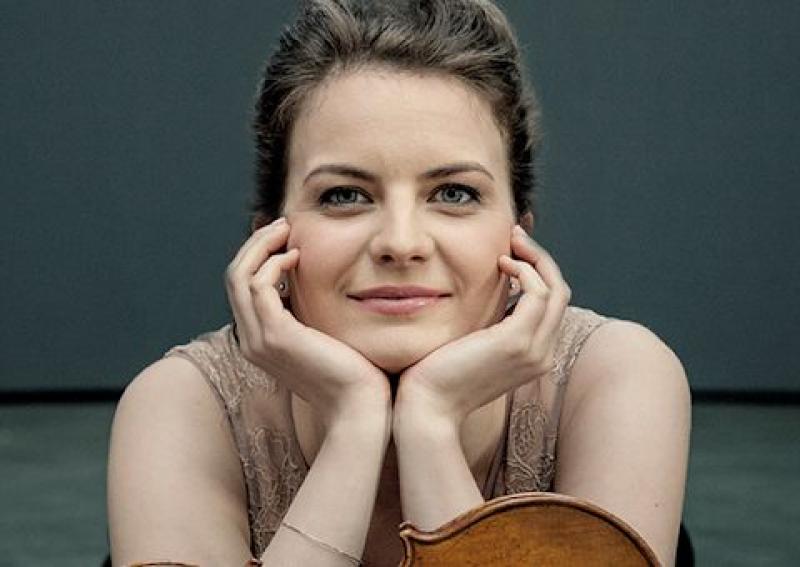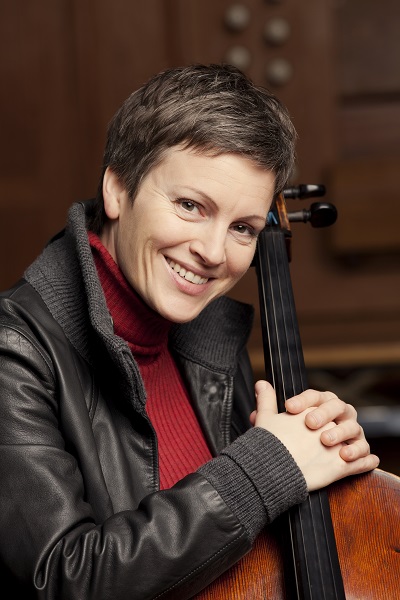Prohaska, Eberle and Friends, Wigmore Hall | reviews, news & interviews
Prohaska, Eberle and Friends, Wigmore Hall
Prohaska, Eberle and Friends, Wigmore Hall
A mix of European chamber musicians with some surprising limitations

A quick plot summary might be required here, because how this programme of Schubert, Pergolesi and Webern came into being was far from obvious. Two young soloists, one a violinist in her late twenties, one a singer in her early thirties, both born in Swabia (part of Bavaria), share the same agent and wanted to do a project together. So they are currently on an eight-date concert tour of five European countries.
Well, the first, the most incontrovertible and probably obvious fact is that there are some astonishingly fine chamber musicians around. Take the French-born horn player Radovan Vlatković. It took him a few moments at the beginning of the Schubert Octet to settle his embouchure, but once in place, the glorious tone, the flawless time and phrasing just poured forth, as it has for the past four decades or so.
 Then there were some of the string players. Bassist Rick Stotijn’s way of adding weight to the bass line when required, but also of playing with infinite delicacy and restraint, were things to just marvel at. The German violist Danusha Waskiewicz and Dutch cellist Quirine Viersen (pictured right by Marco Borggreve) were both ever-attentive and supportive. Viersen in particular gave the performance of the cello part of the Schubert Octet you would hope to hear in heaven. The cello in the Octet has a subsidiary, speak-only-when-you-are-spoken-to kind of part, but her every nuance was serenely paced, and her interpretation of the awkward phrase shapes in the cello variation of the Andante were very special. This concert will live in the memory thanks to Viersen’s life-enhancing cello playing.
Then there were some of the string players. Bassist Rick Stotijn’s way of adding weight to the bass line when required, but also of playing with infinite delicacy and restraint, were things to just marvel at. The German violist Danusha Waskiewicz and Dutch cellist Quirine Viersen (pictured right by Marco Borggreve) were both ever-attentive and supportive. Viersen in particular gave the performance of the cello part of the Schubert Octet you would hope to hear in heaven. The cello in the Octet has a subsidiary, speak-only-when-you-are-spoken-to kind of part, but her every nuance was serenely paced, and her interpretation of the awkward phrase shapes in the cello variation of the Andante were very special. This concert will live in the memory thanks to Viersen’s life-enhancing cello playing.
And then there was clarinettist Pascal Moraguès, who treated every note of the clarinet part in the Octet like the present it is. He also shone in the encore, when he unwrapped another of Schubert's perfect gifts to players of the instrument, the obbligato part in the 's "Romanze" from the crusades Singspiel Die Verschworenen.
And then the two featured artists: Anna Prohaska (pictured below left), who performed in the brief first half – done and dusted in less than half an hour – was very fine indeed in the Schubert Salve Regina. The main need in that piece is to be musical, to float an exquisite, melismatic high melodic line. That she did, and very beautifully. She then sang a 70-second Webern miniature Schmerz immer, Blick nach oben, the briefest of characterful glimpses into an arid expressionist nightmare.
 The Pergolesi C minor Salve Regina, its opening very reminiscent of the same composer’s Stabat Mater, however, exposed some limitations. There was a distinct lack of vocal strength in the lower tessitura which the part required, and diction had a tendency to become indistinct, particularly in the “Eia Ergo” section.
The Pergolesi C minor Salve Regina, its opening very reminiscent of the same composer’s Stabat Mater, however, exposed some limitations. There was a distinct lack of vocal strength in the lower tessitura which the part required, and diction had a tendency to become indistinct, particularly in the “Eia Ergo” section.
Violinist Veronika Eberle led the group well in the first half, but in the Schubert again and again there were wilful and wayward lapses when she was responding to phrases that had already been played. She seemed determined to put herself at odds with the shared syntax of the other players. In the Adagio she was taking a different view of the ornaments, in the following allegro she had a different perception of how the dotted rhythms were weighted, and in the Andante variations she just lagged behind the beat. That said, her dovetailing with Pascal Moraguès at the end of the Minuet was a delight.
If I found limitations from the two young featured artists, and was starting to wonder about the kind of cocooning which these agent-backed soloists appear to have, mine was a minority view. This was an audience single-minded in its determination to compensate for what it lacked in numerical strength (the hall was not quite half-full) in the volume of its football-ishly loud – and not quite Wigmore-ish – whooping and cheering.
rating
Explore topics
Share this article
The future of Arts Journalism
You can stop theartsdesk.com closing!
We urgently need financing to survive. Our fundraising drive has thus far raised £49,000 but we need to reach £100,000 or we will be forced to close. Please contribute here: https://gofund.me/c3f6033d
And if you can forward this information to anyone who might assist, we’d be grateful.

Subscribe to theartsdesk.com
Thank you for continuing to read our work on theartsdesk.com. For unlimited access to every article in its entirety, including our archive of more than 15,000 pieces, we're asking for £5 per month or £40 per year. We feel it's a very good deal, and hope you do too.
To take a subscription now simply click here.
And if you're looking for that extra gift for a friend or family member, why not treat them to a theartsdesk.com gift subscription?
more Classical music
 RNCM International Diploma Artists, BBC Philharmonic, MediaCity, Salford review - spotting stars of tomorrow
Cream of the graduate crop from Manchester's Music College show what they can do
RNCM International Diploma Artists, BBC Philharmonic, MediaCity, Salford review - spotting stars of tomorrow
Cream of the graduate crop from Manchester's Music College show what they can do
 Classical CDs: Bells, whistles and bowing techniques
A great pianist's early recordings boxed up, plus classical string quartets, French piano trios and a big American symphony
Classical CDs: Bells, whistles and bowing techniques
A great pianist's early recordings boxed up, plus classical string quartets, French piano trios and a big American symphony
 Monteverdi Choir, English Baroque Soloists, Suzuki, St Martin-in-the-Fields review - the perfect temperature for Bach
A dream cantata date for Japanese maestro and local supergroup
Monteverdi Choir, English Baroque Soloists, Suzuki, St Martin-in-the-Fields review - the perfect temperature for Bach
A dream cantata date for Japanese maestro and local supergroup
 Aldeburgh Festival, Weekend 1 review - dance to the music of time
From Chekhovian opera to supernatural ballads, past passions return to life by the sea
Aldeburgh Festival, Weekend 1 review - dance to the music of time
From Chekhovian opera to supernatural ballads, past passions return to life by the sea
 Dandy, BBC Philharmonic, Storgårds, Bridgewater Hall, Manchester review - a destination attained
A powerful experience endorses Storgårds’ continued relationship with the orchestra
Dandy, BBC Philharmonic, Storgårds, Bridgewater Hall, Manchester review - a destination attained
A powerful experience endorses Storgårds’ continued relationship with the orchestra
 Hespèrion XXI, Savall, QEH review - an evening filled with laughter and light
An exhilarating exploration of innovation in 16th and 17th century repertoire
Hespèrion XXI, Savall, QEH review - an evening filled with laughter and light
An exhilarating exploration of innovation in 16th and 17th century repertoire
 theartsdesk at the Dublin International Chamber Music Festival - musical revelations, nature beyond
Artistic director Ciara Higgins’ programming ensures plenty of surprises
theartsdesk at the Dublin International Chamber Music Festival - musical revelations, nature beyond
Artistic director Ciara Higgins’ programming ensures plenty of surprises
 Müller-Schott, RSNO, Søndergård, Usher Hall, Edinburgh - spectacular Shostakovich to end the season
Brilliant orchestral results, while the cellist walks a tightrope in the Second Cello Concerto
Müller-Schott, RSNO, Søndergård, Usher Hall, Edinburgh - spectacular Shostakovich to end the season
Brilliant orchestral results, while the cellist walks a tightrope in the Second Cello Concerto
 Classical CDs: Cannons, culverts and mooching cattle
Box sets celebrating a pair of conductors, plus baroque vocal music and a beguiling bassoon anthology
Classical CDs: Cannons, culverts and mooching cattle
Box sets celebrating a pair of conductors, plus baroque vocal music and a beguiling bassoon anthology
 Marwood, Crabb, Wigmore Hall review - tangos, laments and an ascending lark
Accordion virtuoso’s brilliant arrangements showcase the possibilities of the instrument
Marwood, Crabb, Wigmore Hall review - tangos, laments and an ascending lark
Accordion virtuoso’s brilliant arrangements showcase the possibilities of the instrument

Add comment